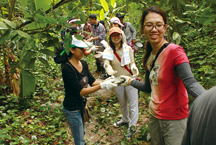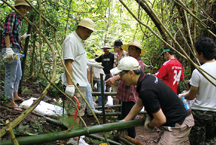Yokohama Rubber Environmental policy
Following the principle of dealing fairly with society and valuing harmony with the environment, we shall assert our world-class strengths in technologies for protecting the environment.
- Yokohama Rubber will globally initiate environmentally-conscious measures in all of its activities, and will make all of its manufactured goods environmentally-friendly products.
- Yokohama Rubber will deepen communications with stakeholders and will strive to make contributions to local communities and to society as a whole.
- Yokohama Rubber will strengthen its environmental management system and will continually strive to help improve the environment by using preemptive approaches to mitigate its impacts on the environment, prevent environmental pollution, and reduce sensory nuisances.
- Yokohama Rubber will comply with all related laws, regulations, and agreements as well as endeavor to continually implement activities that help improve the environment.
- Yokohama Rubber will strive to prevent global warming, conserve energy and resources as well as promote resource recycling aimed at the fulfillment of a recycling-oriented and low-carbon society.
- Yokohama Rubber will strive to conserve biological diversity and use organic resources sustainably in its business activities.
- Yokohama Rubber will promote harmony with local communities as part of its commitment to work with and become a company that is trusted by local communities.
- Yokohama Rubber shall publish this policy and make it known to all.
We consider the “realization of a low carbon society,” the “realization of a resource-circulation society,” and “biodiversity conservation” as environmental challenges, and address those issues in parallel with the “homogenization and advancement of environmental management.” To realize a low carbon society, we set middle- and long-term goals for GHG emissions, and began by conducting surveys of emissions across the value chain, including Scope 3, so as to decide how to deal with these issues. In the project to realize a resource-circulation society, we have already reduced the amount of industrial waste and increased the number of zero-emissions production sites. In our activities to conserve biodiversity, the Mie factory held the first debriefing meeting on our biodiversity conservation activities with local NPOs, government officials, and community residents. We also continue our tree-planting initiative. In the homogenization and advancement of environmental management activities, we held the first area environment meeting as a means of initiating global environmental management, and are planning to expand such area meetings across Asia and North America this year. We will seek to enhance our environmental management by promoting these activities.
Mitsuo Sakurai
Associate Director CSR Division
General Manager, CSR & Environmental Affairs Department
Yokohama Rubber Group
GHG emissions in Scope 1, 2, 3
We assessed GHG emissions in Scope 1, 2, 3. In FY 2013, our GHG emissions totaled about 24 million tons, and 97% were Scope 3. Among Scope 3, 83% came from “usage of products.” We will strive to promote the dissemination of eco-friendly products to reduce GHG emissions.
Biodiversity conservation activities in the Amata area
YOKOHAMA TIRE MANUFACTURING (THAILAND)
We participate in activities for “living in harmony with the environment.” In cooperation with local companies, NGOs, and residents, we built a dam to prevent flooding in order to provide security in daily life for the residents of the Kao maikeaw area. In June 2013, 77 volunteers (486 total participants) participated in the activities, which were held on a holiday, creating a great deal of excitement.
Biodiversity conservation activity at production sites
Based on the “biodiversity conservation guidelines,” we have initiated biodiversity conservation activities at 7 domestic factories, under the theme of “protection of the water environments around the factories.” Regular water quality surveys of the river we use for water intake and discharge for production, and regular monitoring of aquatic organisms, vegetation, and avian species, are conducted. We utilize the results for our conservation activities. We held the first biodiversity conservation debriefing meeting at the Mie plant (Ise city, Mie) to exchange opinions with our stakeholders.
-
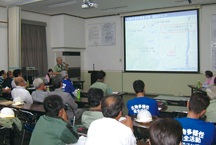
Biodiversity conservation debriefing meeting
-
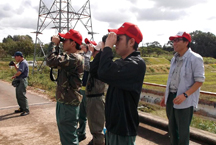
Bird-watching at the Ibaraki Plant
-
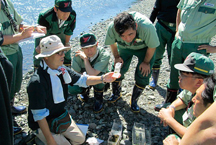
Hiratsuka Plant (water quality survey)

